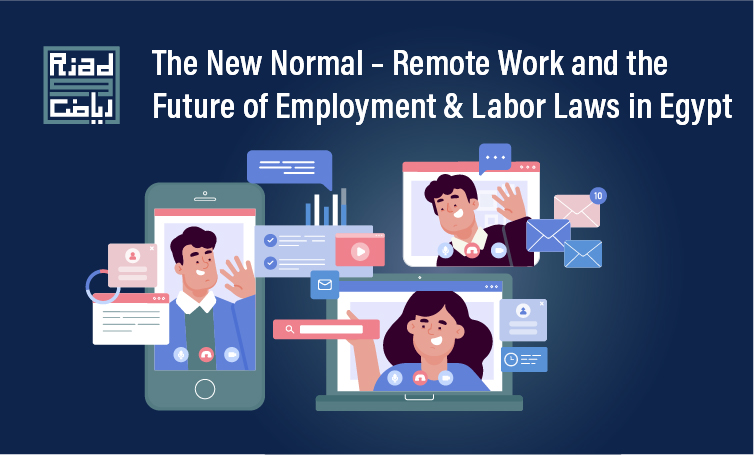
The New Normal – Remote Work and the Future of Employment & Labor Laws in Egypt
Introduction
The digital transformation and prevalence of online technology have created new work models; the workforce is becoming mobile and employees are becoming able to do their jobs from anywhere through digital means of communication. Such work models break the traditional rule of strict adherence and commitment to workplaces and provide more flexibility to employees. The global COVID-19 pandemic has fundamentally accelerated the widespread of these new work models.
Egypt’s Digital Transformation
In Egypt, the government has given high priority to digital transformation by launching several initiatives to encourage using electronic means of communication and information technologies in various sectors including the corporate and businesses, banking and finance, healthcare and life-sciences, education, taxation and social insurance etc.
A number of important laws have been enacted during last few years to support the government’s digital transformation strategy. This includes the E-payment Law No. 18/2019, the Anti-Cybercrime Law No. 175/2018, the New Banking Law No. 194/2020 (regulating for the first time e-banking and financial technology “FintTech”), the Unified Tax Procedures Law No. 206/2020 (implementing electronic tax reporting and collection systems), the New Customs Law No. 207/2020 (establishing an electronic system to track goods and to electronically submit and exchange documents), the New Consumer Protection Law No. 181/2018 (regulating e-commerce and remote contracting), and the Personal Data Protection Law No. 151/2020.
Remote Work Models Emerging Globally and in Egypt
This digital transformation has changed the working lifestyle and evolved new models of work relationships. The common element in such new work models is that employees perform their jobs, partially or entirely, remotely outside the work office by using technology and digital tools. Under these models employees are given flexibility – to different extents – to determine their work routine, working hours, the places in which they will perform work and – in some cases – the number of clients they will serve and the workload they will perform. This comes contrary to the traditional work relationships which are essentially based on monitoring and controlling employees inside workplaces.
Below are the most common terminologies used for remote work models which grew globally and in Egypt:
- Tele-work
Generally, “Tele” is added to words to refer to distance. Hence, “Tele-work” is a work arrangement which allows employees to perform job tasks away from the work office. Employer and employee can choose between alternative workplaces such as home, tele-work centers, co-working spaces or other alternatives.
- Working from Home (“WFH”)
Since the outbreak of Covid-19 pandemic, WFH became common worldwide. WFH is similar to the traditional work; except the non-physical attendance of the employees in the workplace as they perform their job duties remotely from home.
- Hybrid Work
“Hybrid Work” is another work model based on rotation and combination between both work from home and office work. This model is effective in keeping the necessary social distance to avoid the spread of Covid-19 between employees by reducing the presence of large number of employees in the office at the same time.
Hybrid Work gives employers the ability to reduce the gap between remote and office work, and balancing between work tasks need to be performed inside the office and tasks that can be completed remotely.
- Mobile Work
Another model of remote work is known as the “Mobile Work” which depends on making available means of technology and networks and allowing employees to have access to the information, clients, and systems they need in order to complete their work regardless of their physical location and without being inside the office.
- Gig Work, Platform Work
The gig work or platform work is a different model. It is a temporal relationship whereby the employer hires persons and freelancers to carry out specific work for a certain period of time for an agreed payment. It is mainly based on flexibility, independence and temporality, and it depends on the demand and supply in the job market.
The gig economy offers different types of jobs such as independent contractors, freelancers, on-demand employees, project-based employees and temporary or part-time employees. An obvious example of the gig work is the employees for digital platforms and online applications, i.e. Airbnb and Uber.
Legal Nature of Remote Work Models
There has been a long debate whether persons involved in remote work models (particularly those working in the gig economy) are deemed “workers” and hence subject to the implementation of the employment law, or alternatively they are independent contractors or consultants due to the flexibility and independence they enjoy while performing their jobs.
The European Commission last February launched a public consultation to look into the legal employment status and conditions gig economy workers and to improve the rights of such workers.
Courts in different countries like the UK, France, Spain and some regional courts in Brazil have issued recent judgments in relation to Uber drivers where they deemed them “workers”, despite the non-existence of written employment contracts. These court judgments were based on the ground that there is a subordination relationship between the drivers and Uber given that:
- Drivers are unable to get customers without using Uber’s Platform (which is totally controlled by Uber).
- Drivers are obliged to follow Uber’s terms and conditions while dealing with the customers.
- Drivers are unable to set or adjust the fare prices which are fixed by Uber’s platform.
- Drivers are provided with personal accident insurance by Uber.
- Drivers can be suspended or penalized by Uber if they declined a certain number of rides.
- Drivers can be removed from Uber application based on customers’ ratings.
How Egypt’s Laws Can Cope with Flexible/Remote Work Models?
The Egyptian Labor Law No. 12/2003 (the “Labor Law”) is historically influenced by the industrial revolution of the 19th century. The current provisions of the Labor Law are essentially focused on employees’ physical presence inside the workplace and do not include provisions regulating flexible or remote work models. Many of the provisions of the Labor Law need to be updated to cope with the global digital revolution.
We herein suggest some key matters that need to be considered under the Labor Law and its executive regulations in order to adapt with the new work models:
-
Un-written Employment Relationships: the relationship between the employer and the employee in the remote work models will not necessarily be written-down in a contract. Therefore, the Labor Law in Egypt should acknowledge that written contracts are not necessarily the “starting point” of an employment relationship. The nature of the legal relationship has to be basically assessed from parties’ conduct and arrangements and not from written agreements.
-
Electronic Signature and Writings: e-signature and e-writing are regulated, in Egypt, by virtue of Law No. 15/2004 which gives e-signature the same evidentiary weight as ‘wet ink’ signature if it fulfills a number of conditions and technical requirements. The law provides that qualified electronic signature can be used in civil, commercial and administrative dealings. E-signing should accordingly be recognized in concluding employment contracts between employers and employees.
Moreover, the Labor Law should be amended to expressly give evidentiary weight – in labor and employment contexts – to e-signature, recorded virtual meetings, terms and conditions of digital platforms and applications, electronic correspondence, emails, text-messages (i.e. correspondence in relation to work instructions, work organization, online appraisals reports, records of annual leaves and absence, working hours … etc.). -
Electronic Work Policies and Code of Conduct: the Labor Law requires employers to physically display work and disciplinary policies inside the workplace. It is now becoming essential for the Labor Law to allow employers to announce work policies, code of ethics and disciplinary polices to employees via electronic means (i.e. emails, work clouds, data-bases and servers, virtual meetings… etc).
-
Performance Management and Salaries: in the lack of physical direct contact between employers and employees in the remote work models, successful implementation of these work models requires applying effective performance management plans and using easy communication tools between employers and employees (Such as video conferences and group chats). This will enable employers to supervise and track the work related tasks, setting remote working schedules for employees, sharing ideas and plans, establishing performance indicators, and increasing productivity level by offering incentives and rewarding schemes. The Labor Law should also be updated to allow employers to adopt salary scales linked to performance and achieved targets.
-
Termination for Performance: courts in Egypt should start acknowledging “insufficient-performance” as a legitimate ground for terminating employment relationships. To avoid arbitrary dismissal by employers, the Labor Law can oblige employers to implement a tight Performance Development Plan (PDP) before terminating an employee for performance related grounds.
-
Electronic Personnel Records: the Labor Law currently obliges employers to maintain HR/personnel records inside the workplace (including employees’ names, professions, skill levels, social status, address, recruitment dates, annual leaves and absence, disciplinary records, appraisal reports, etc). The Labor Law should allow employers to keep these HR records electronically to cope with the prevailing technological transformation.
- Social Security Benefits: the social security laws in Egypt should adopt fundamental changes in relation to the nature and types of work hazards which subject to its application; for example, the law should pay attention to employee’s well-being and allow covering mental health hazards (i.e. fatigue, tiredness, stress, work burn-out). In addition, the methods of proving work injuries and sickness of employees who work remotely require major alternations.
What Companies in Egypt Need to Consider to implement Remote Work Models?
-
Digital Infrastructure: In order to guarantee successful application of flexible/remote work models, companies should equip their employees with appropriate digital infrastructure and establishing strong software systems and networks to enable employees to perform their jobs and securely have remote access to the information and work servers.
-
Cybercrimes & Securing Work Systems: the digital infrastructure of the companies should be supported by a network security system, data backup and recovery system to eliminate cybercrimes and potential risks of divulging company’s confidential information or clients’ data. Such measures should be taken in accordance with the Egypt’s recent Anti-cybercrime Law No. 175/2018.
-
Digital Trainings: companies must provide appropriate training programs and educate employees about digital work, information technology and how to efficiently use the company’s digital systems.
-
Data Protection: companies must adhere to a proper data protection compliance system with respect to the personal data they collect or process; including the data of their clients and employees. This compliance system must adhere to the provisions of the newly issued Data Protection Law No. 151/2020.
-
Confidentiality and NDAs: companies should request employees to sign confidentiality and non-disclosure agreements – at the beginning of their employment – to protect the information of the company and the clients.
-
Restrictive Covenants: companies should incorporate in their employment contracts appropriate “restrictive covenants clauses” to enforce obligations of non-compete, non-solicitation, non-poaching on their employees.
- Employees’ Health and Safety: current employment and social security laws in Egypt include provisions regulating occupational safety and health; however these provisions are mainly designated to assure the safety and adequacy of physical workplaces. Working remotely will result in new safety and health risks and threats to employees (i.e. the risk of spending uninterrupted long work hours without breaks, the lack of daily interactions with work colleagues which may affect the mental health of employees and cause isolation, anxiety, stress or other mental hazards). Companies should adopt policies to handle such risks by setting rules for remote working. Employees should also be given the “right to disconnect” to be able to refrain from engaging in work-related tasks outside normal working hours or during annual leaves or official holidays. This will contribute to maintain the work-life balance of employees.
For any inquiries, please contact Dr. Eman Riad or Heba El-Abd
